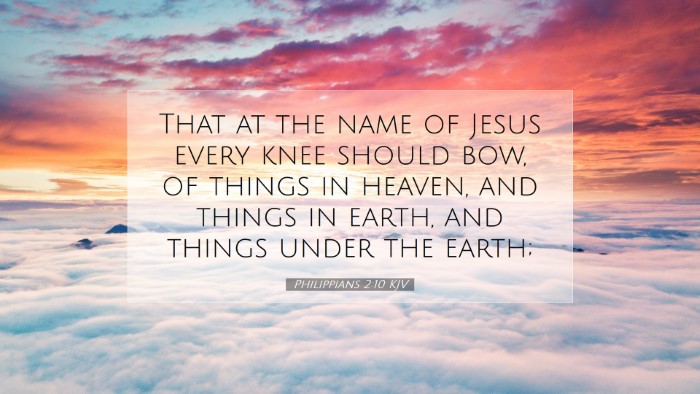Philippians 2:10 - A Commentary
Verse Text: "That at the name of Jesus every knee should bow, of things in heaven, and things in earth, and things under the earth;" (Philippians 2:10, KJV)
Introduction
The profound significance of Philippians 2:10 lies within its proclamation of the lordship of Jesus Christ. This verse serves as a pivotal reminder of Christ's exaltation and sovereign authority, encapsulating the eschatological theme of universal submission to Him. Major public domain commentaries shed light on this verse, enriching its theological implications for pastors, students, and scholars alike.
Theological Insights
In the landscape of Christian doctrine, Philippians 2:10 addresses the reality of submission to Christ as an unavoidable reality. Each commentator provides a unique perspective on this profound truth.
-
Matthew Henry:
Henry emphasizes the comprehensive nature of submission that this verse envisions. He asserts that "every knee" signifies a complete relinquishment of pride and autonomy in the presence of Christ. This bowing of knees is not merely physical but embodies an acknowledgment of Christ’s divine authority.
-
Albert Barnes:
Barnes elucidates that the phrase "every knee should bow" indicates both the living and the dead, asserting Jesus’ preeminence over all realms—celestial, terrestrial, and infernal. He points out that such submission is not optional but a definitive expression of Christ’s sovereign rule, reinforcing the triadic structure of "things in heaven, and things in earth, and things under the earth."
-
Adam Clarke:
Clarke offers a poignant interpretation of the universal declaration of Christ’s lordship. He emphasizes the implications of this bowing as a universal acknowledgment of Christ's position as Savior and Judge, noting that the recognition will manifest in judgment day, where all creation must account for their relationship with Christ.
Contextual Analysis
This verse occurs within a rich context, where the Apostle Paul encourages humility and unity among believers. In Philippians 2:5-11, Paul presents the humility of Christ, portraying His incarnation and subsequent exaltation. The placement of Philippians 2:10 continues this theme, indicating that as Christ humbles Himself, the Father elevates Him, leading to universal recognition of His lordship.
The Implications of Every Knee Bowing
The implications of this bowing are multi-faceted, extending into personal, ecclesial, and eschatological realms:
-
Personal Implications:
For individuals, this verse calls for introspection regarding Christ's authority in their lives. It beckons believers not to wait for the inevitable bowing on the day of judgment but to willingly submit to Him in their daily walk.
-
Ecclesial Implications:
In the church, this teaching fosters an environment of unity and love, as each member recognizes Christ as the head, promoting servanthood rather than rivalry.
-
Eschatological Implications:
This verse serves as a reminder of the coming judgment when all will recognize Christ’s authority. The acknowledgment will serve either as a joyful recognition for believers or a tragic admission of His sovereignty for those who have rejected Him.
Conclusion
Philippians 2:10 encapsulates the essential Christian belief in the lordship of Jesus Christ over all creation. As gleaned from the insights of Matthew Henry, Albert Barnes, and Adam Clarke, the verse serves to encourage believers towards humility and affirm their commitment to live under Christ’s sovereign rule. The anticipated future reality, where every knee shall bow, reinforces the urgency of this message, calling all to recognize the supremacy of Jesus in their hearts and lives today.


